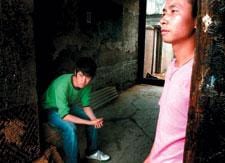The opening scene of Tongzhi in Love — in which “Frog” Cui, a 28-year-old university student in Beijing describes the romantic rush of meeting his first boyfriend — features just the sort of angst-ridden melodrama you might expect from stereotypically repressed, gay Chinese man-child mama’s boys.
However, what follows is a surprisingly mature, unsentimental look into tongzhi (Chinese slang for gay) culture through the lives of three men who have become a kind of support group for each other in Beijing.
Cui is unsure of how his life will turn out and seems to look to the others for guidance. Pressures mount when his dutiful mother, upset by his lack of interest in having a girlfriend, decides to move into his Beijing apartment in hopes of helping him meet girls.
Through a series of stunning animated vignettes, Cui expresses his own inner conflict and also illustrates the pressures of being expected to preserve his family’s future in the age of China’s one-child policy.
Next is Xiang Feng, who moved to Beijing from the countryside and discovered his queer identity as a “zero” (Chinese slang for bottom).
With a wry sense of humour, Feng relates his initial desire to meet other men who love men and the realities of cruising at a popular park.
Rounding out the group is Long Ze, a straight-acting man who sleeps with men in Beijing while sustaining a relationship with a girlfriend back home.
While recognizing sex as a need, perhaps second only to food, Ze lashes out at the idea of coming out, saying it is a selfish choice.
Despite his resolve to continue keeping up appearances, and his plans to eventually get married, Ze’s self-destructive temptations and unresolved guilt illustrate the cost of attempting to lead two separate lives.
Through candid interviews and group discussions we get to see the very serious, contemplative sides of young men caught between social and familial expectations and the intense but brief chances they have to express their tongzhi identities in the city.
With very lush and voyeuristic images, we are taken deep into their world of Beijing’s gay underground, including footage taken from within a tongzhi bathhouse.
The story moves from the relative freedom of Beijing to the countryside as Cui and Feng plan a trip to Feng’s family home. Rather than being a cold place of strict repression, Feng’s village is surprisingly an oasis of belonging, warmth and love.
As Feng contemplates coming out to his parents, we come to realize what is truly at stake for these tongzhi who feel they must decide between their love of men and their love for their families.
Academy award-winning director Ruby Yang brings us to a world where the moral code is not dictated by an omniscient god but by a sense of duty, where sexual expression is possible but long-term partnerships are shunned.
For those of us living in the West, the personal stories and experiences of the three men in Tongzhi in Love provide us with greater insight into the complexities of queer repression.
While frustrating and disturbing at times, Tongzhi in Love is sure to be a film that will remain with you for some time.

 Why you can trust Xtra
Why you can trust Xtra


